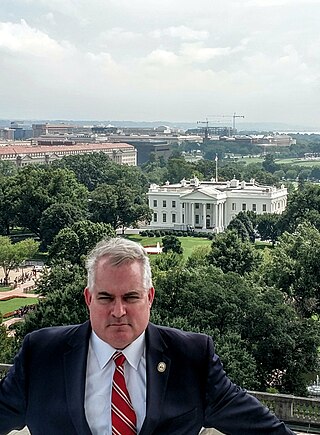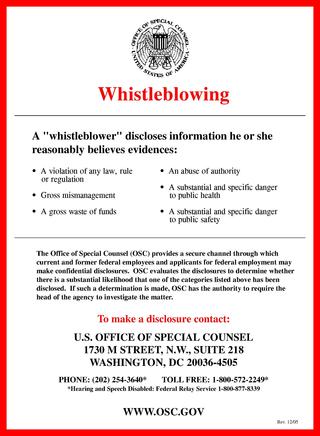Related Research Articles

The Intelligence Reform and Terrorism Prevention Act of 2004 (IRTPA) is a 235-page Act of Congress, signed by President George W. Bush, that broadly affects United States federal terrorism laws. The act comprises several separate titles with varying subject issues. It was enacted in response to the terror attacks of September 11, 2001.

Sibel Edmonds is a former contract translator for the Federal Bureau of Investigation (FBI) and the founder and editor-in-chief of the independent news website NewsBud.

The Homeland Security Act (HSA) of 2002, was introduced in the aftermath of the September 11 attacks and subsequent mailings of anthrax spores. The HSA was cosponsored by 118 members of Congress. The act passed the U.S. Senate by a vote of 90–9, with one Senator not voting. It was signed into law by President George W. Bush in November 2002.

The United States Office of Special Counsel (OSC) is a permanent independent federal investigative and prosecutorial agency whose basic legislative authority comes from four federal statutes: the Civil Service Reform Act, the Whistleblower Protection Act, the Hatch Act, and the Uniformed Services Employment and Reemployment Rights Act (USERRA). OSC's primary mission is the safeguarding of the merit system in federal employment by protecting employees and applicants from prohibited personnel practices (PPPs), especially reprisal for "whistleblowing." The agency also operates a secure channel for federal whistleblower disclosures of violations of law, rule, or regulation; gross mismanagement; gross waste of funds; abuse of authority; and substantial and specific danger to public health and safety. In addition, OSC issues advice on the Hatch Act and enforces its restrictions on partisan political activity by government employees. Finally, OSC protects the civilian employment and reemployment rights of military service members under USERRA. OSC has around 140 staff, and the Special Counsel is an ex officio member of Council of Inspectors General on Integrity and Efficiency (CIGIE), an association of inspectors general charged with the regulation of good governance within the federal government.

Russell D. Tice is a former intelligence analyst for the United States Air Force, Office of Naval Intelligence, Defense Intelligence Agency (DIA), and National Security Agency (NSA).

Kohn, Kohn & Colapinto is a Washington, D.C.-based international whistleblower rights law firm specializing in anti-corruption and whistleblower law, representing whistleblowers who seek rewards, or who are facing employer retaliation, for reporting violations of the False Claims Act, Foreign Corrupt Practices Act, Dodd-Frank Wall Street Reform, Sarbanes-Oxley Acts, Commodity and Security Exchange Acts and the IRS Whistleblower law.

The Whistleblower Protection Act of 1989, 5 U.S.C. 2302(b)(8)-(9), Pub.L. 101-12 as amended, is a United States federal law that protects federal whistleblowers who work for the government and report the possible existence of an activity constituting a violation of law, rules, or regulations, or mismanagement, gross waste of funds, abuse of authority or a substantial and specific danger to public health and safety. A federal agency violates the Whistleblower Protection Act if agency authorities take retaliatory personnel action against any employee or applicant because of disclosure of information by that employee or applicant.
The anti-gag statute is a little-known legal boundary in the long struggle in the United States between Executive Branch secrecy and the United States Congress and the public's right to know. Since 1988, the statute has been an annual appropriations restriction drawing the line on Executive branch efforts to limit whistleblowing disclosures to information that is specifically identified in advance as classified. The anti-gag statute requires a mandatory, specifically worded addendum on any nondisclosure policy, form or agreement to legally spend money to implement or enforce the gag order.

The Notification and Federal Employee Antidiscrimination and Retaliation Act of 2002 is a United States federal law that seeks to discourage federal managers and supervisors from engaging in unlawful discrimination and retaliation. It is popularly called the No-FEAR Act, and is also known as Public Law 107–174.
The Government Accountability Project (GAP) is a nonprofit whistleblower protection and advocacy organization in the United States. It was founded in 1977.
The National Whistleblower Center (NWC) is a nonprofit, nonpartisan, tax exempt, educational and advocacy organization based in Washington, D.C. It was founded in 1988 by the lawyers Kohn, Kohn & Colapinto, LLP. As of June 2021, Siri Nelson is the executive director. Since its founding, the center has worked on whistleblower cases relating to environmental protection, nuclear safety, government and corporate accountability, and wildlife crime.
The National Defense Authorization Act for Fiscal Year 2008 is a law in the United States signed by President George W. Bush on January 28, 2008. As a bill it was H.R. 4986 in the 110th Congress. The overall purpose of the law is to authorize funding for the defense of the United States and its interests abroad, for military construction, and for national security-related energy programs. In a controversial signing statement, President Bush instructed the executive branch to construe Sections 841, 846, 1079, and 1222 "in a manner consistent with the constitutional authority of the President".
The Intelligence Community Whistleblower Protection Act of 1998, amending the Central Intelligence Agency Act of 1949 and the Inspector General Act of 1978, sets forth a procedure for employees and contractors of specified federal intelligence agencies to report complaints or information to the United States Congress about serious problems involving intelligence activities.

The Department of Defense Whistleblower Program in the United States is a whistleblower protection program within the U.S. Department of Defense (DoD) whereby DoD personnel are trained on whistleblower rights. The Inspector General's commitment fulfills, in part, the federal mandate to protect whistleblowers. It also administers the Defense Intelligence Community Whistleblower Protection Program (DICWP), as a sub-mission for the intelligence community. The Inspector General's Defense Criminal Investigative Service also conducts criminal investigations which rely, in part, on Qui Tam relators.

Daniel P. Meyer is an attorney admitted in the District of Columbia and is currently the Managing Partner of the Washington D.C. Office of Tully Rinckey, PLLC, an international law firm headquartered at Albany, New York, and co-founded by Mathew Tully and Greg Rinckey.
The Defense Intelligence Community Whistleblower Program (DICWP) is a sub-mission of the United States Department of Defense Whistleblower Program. In administering the DICWP, the Office of the Inspector General, U.S. Department of Defense (DoDIG) balances the competing national security and separation of powers interests raised by whistleblowing within the Defense Intelligence Community.The DoDIG provides a safe, authorized conduit for Defense Department whistleblowers to disclose classified information. The Inspector General also has authority to investigate whistleblowing reprisal allegations filed by civilian and military members of the Defense Intelligence Community. It therefore accepts the disclosures and provides source protection for those providing the information. The Department of Defense funds and supervises much of the Republic's intelligence gathering. DoD IG accordingly provides protection to a large number of civilian and military intelligence personnel.

A whistleblower is a person who exposes any kind of information or activity that is deemed illegal, unethical, or not correct within an organization that is either private or public. The Whistleblower Protection Act was made into federal law in the United States in 1989.
The United States Presidential Policy Directive 19, signed by President Barack Obama, is designed to ensure that employees who serve in the Intelligence Community or have access to classified information can effectively report waste, fraud, and abuse, while protecting classified information. It is the executive order establishing standards for all Federal agencies with employees covered by the Directive, including those under Defense Intelligence Community Whistleblower Protection and the U.S. Department of Defense Whistleblower Program. It also prohibits retaliation against these employees for their reports. PPD-19 accordingly establishes a system of Intelligence community whistleblowing and source protection under the Office, Director of National Intelligence and supervised by the Inspector General of the Intelligence Community.

The Intelligence Authorization Act for Fiscal Year 2014 is a U.S. public law that authorizes appropriations for fiscal year 2014 for intelligence activities of the U.S. government. The law authorizes there to be funding for intelligence agencies such as the Central Intelligence Agency or the National Security Agency, but a separate appropriations bill would also have to pass in order for those agencies to receive any money.

The All Circuit Review Extension Act is an Act that extended for three years the authority for federal employees who appeal a judgment of the Merit Systems Protection Board (MSPB) to file their appeal at any federal court, instead of only the U.S. Court of Appeals. This was a pilot program established in the Whistleblower Protection Enhancement Act of 2012 to last only two years.
References
- ↑ Stephen Barr (2005-04-25). "Whistle-Blowers Urge Congress to Get Tougher on Retaliation". The Washington Post. Retrieved 2009-12-30.
- ↑ "Federal Employee Protection of Disclosures Act (Introduced in House)". Library of Congress. Archived from the original on 2014-09-24. Retrieved 2009-12-30.
- ↑ "Federal Employee Protection of Disclosures Act (Introduced in House)". Library of Congress. Archived from the original on 2016-07-04. Retrieved 2009-12-30.
- ↑ "NSWBC Members". National Security Whistleblowers Coalition. Retrieved 2013-05-27.